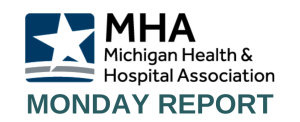The MHA Service Corporation (MHASC) board focused its Feb. 7 meeting on supporting the MHA Strategic Action Plan priorities to address workforce support and innovation, viability, behavioral health improvement, health equity and more. The board was joined by Bruce Brandes, president, care.ai, an MHA Endorsed Business Partner (EBP). Brandes provided a strategic overview for how AI and ambient intelligence is transforming care delivery models. care.ai sponsored a joint lunch for MHA and MHASC board members and provided an update on its Smart Care Facility Operating Platform. The MHASC is planning to launch new Endorsed Business Partners and innovative solutions in the coming months.
The MHA Human Resources (HR) & Workforce Council met Jan. 30 to discuss current HR priorities and review its role in advancing the mission of the MHA and the role of human resource leaders. The council provided input on legislative and regulatory issues relevant to healthcare employers, including diversity, equity and inclusion efforts, workplace safety and workforce development. Members provided feedback on current workforce-related legislative efforts and shared valuable insights with colleagues during a round-table session addressing 2024 priorities, innovative ideas, lessons learned and more. The HR Council is looking forward to networking with colleagues at the upcoming MHA HR Conference on March 5.
The MHASC provides critical support to the MHA in the form of non-dues revenue through its Data Services, Unemployment Compensation Program and EBP program. The MHASC’s mission is to deliver innovative solutions that help improve value and performance, addressing various business needs including workforce, supply chain, revenue cycle, strategic growth solutions and more. Members are encouraged to visit the MHA Business Services webpage to learn more about the resources available.
Questions regarding the MHASC Board should be directed to Ruthanne Sudderth at the MHA.


 Healthcare Worker Protections Pass State Senate
Healthcare Worker Protections Pass State Senate Clinician Q & A: Pregnancy and Infant Loss
Clinician Q & A: Pregnancy and Infant Loss Patient Safety: A Case-based Innovative Playbook for Safer Care Published
Patient Safety: A Case-based Innovative Playbook for Safer Care Published Are Employers Ready to Engage the Health Industry Head On?
Are Employers Ready to Engage the Health Industry Head On?